InZync poetry session, 13 April 2012, Amazink Eatery, Kayamandi, Stellenbosch.
RIAAN OPPELT
The monthly SLiP/InZync poetry event made a welcome return to its home venue, the Amazink eatery in Kayamandi on Friday, April 13. The event marked the one-year anniversary of SLiP and the In-Zync poetry evenings as the first ever event was hosted on Friday, 1 April 2011. No-one seemed to comment on the fact that it was SLiP’s birthday but then, with one of the featured poets in particular, it certainly felt as if a birthday gift was given and left behind in the memories of all present. No “Friday the 13th” bogeys for us, just sheer goodwill.
It was a stuffy night ahead of one of the early winter weekends for 2012. Once again we were indoors, seated at tables, drinking good beers for good prices because we needed solace after the latest petrol price hike and, well, it really felt a little bit like a homecoming. It was just damn good to see everyone again. With many changing faces in the crowd and many newcomers you might think it’s a funny notion of “everyone” to be playing around with, but the regulars, the old faithfuls, were there. I’m talking about some 2011 Amazink open mic regulars, the entire SLiP team, a certain Queen and King and some people in the audience that, I believe, have never missed one poetry evening. Happy birthday indeed; it was a commemorative return, even if no-one knew it.
With the great amount of interest these poetry evenings attract, it was no surprise that the event started late because of many people still streaming in through the doors all buzzing and excited and delaying the start. In fact, the excitement had us loud and impatient, as if we were children, and our host, Adrian Different, had to be the dad-figure in calling for our attention to get us quiet and respectful. At one point he even looked as if he had thoughts of removing his belt in that old-school parental way that Julius Malema can finally tell us something about these days. As he always does, Adrian opened the evening with a poem, an impassioned piece called “Never Again”, directed at a friend, someone who figures in the poem as a reflection of the speaker. Unusually for Adrian, this was quite an intimate piece, questioning the present of a friendship very much created by the other person’s difficult past. With the revelation of an unequal tenderness, the “never again” refrain sounds true for both parties, amidst delicate natural imagery. It was as easily a “me” poem as it was an “us” poem, evidence of Adrian adding more variety to his work. This, the first poem of the night, would be a harbinger of things to come, especially as the final poem of the night returned to this kind of closeness.
Coco
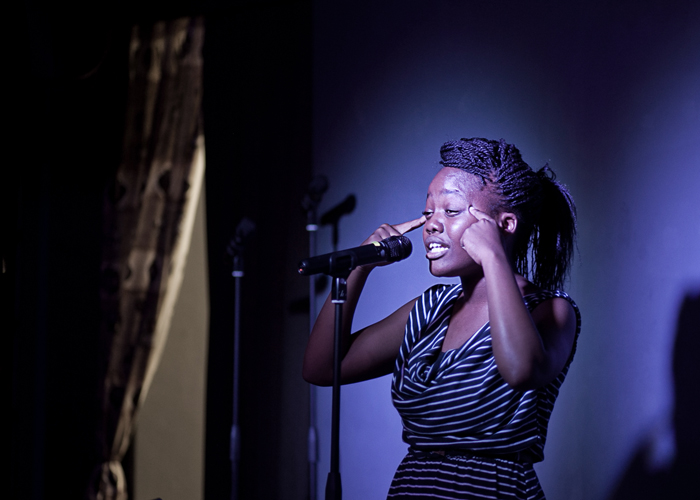
Our first poet was Coco Putuma, friendly, modest and poetically gargantuan in a small frame. Her first piece, “Public Lyricist”, was quite unlike any other set-opener we’ve yet experienced at Amazink. Resounding in astonishing challenges and devilish image-play, the public lyricist is suggested through challenges to the postmodern, so-called politically correct status quo, and Coco framing these challenges in a child telling its mother what it wants to be when grown up makes this harrowing, vital stuff.
She started the piece off by singing “This is a cold war, you better know what you’re fighting for”, and then took the voice of the child telling its mother all the ways it would appropriate the intensity of social living through absurd boundaries. The list of ambitions and deliberately ironic taunts at work here would put weed-smoking student activists to shame: “Mama, I want to be a terrorist…steer verbal airplanes into deaf twin towers”, or try “what if I told you God was an Imperialist, that he colonised my fleshly desires?” Language’s role in cultural history, religious talk of divine inheritance and societal expectations – these are all covered by Coco’s top-of-her-game observations and considerations, so any argument that her scope was too broad for her words went out the postcolonial window with relentless ball-passing, as if Coco was her own football team lining up the mother of all goals at its convenience.
Consider this savvy association of religion and unity (and how eerily it looks ahead to a later poet’s look at marriage):
I want to wash Pride’s feet, meet Joy, introduce him to Peace, converse with Love, think about Kindness, daydream about Dreams… see Her escort My will to God’s destiny… together walk down the aisle of lifetime fidelity because, you see, He has been faithful to me already when I hadn’t even said ‘I do’
Now consider that with what comes next:
What if I told you I was xenophobic? … I want to dispute existentialism / as reconciliation to creation / I want to be Controversy / vacuuming the dirt under your carpets
What we have here is an extraordinary ability to take both expected concords any educated life is usually asked to make good on, as well as pejorative flashes to the contrary (the necessary dark side to the light) that merely serves as a device to reach a destination ultimately more satisfying. This kind of thing is academic, sure, but few academics could ever express it so extraordinarily. At best we’d fall out of our own verbal airplanes owing to fear of heights long before any towers are in sight. Take a leaf from her book and find out how, because Coco knows.
Coco then asked the crowd’s permission to get a little bit more intimate with her next item, “Recollection”, and the “yes” affirmative they gave her indicated that, already, the intimacy was looking for the nearest orgy. Coco couldn’t help but acknowledge the good vibe she was instrumental in creating. A short piece, “Recollection” torpedoed us into the small room of an abusive or unstable relationship, in which a cocaine-addicted partner opens the door to discomfort and terror. The hem of a dress, at first “done” and then “undone”, is posited as a symbol of resistance, distraction, sorrow and resilience and here again we could both look back to Adrian’s opening poem (which mentioned an abusive relationship) and look ahead to vexing variations on the same theme from another poet later on. Two poems in and already the night was on fire.
Coco then asked to do a poem, “Woman”, “especially for the ladies”. Now, when you hear that about a million times a night in most clubs from the microphones of otherwise misanthropic deejays and you hear women screaming enthusiastically each time as if it’s still a surprise, it wears off and becomes more boring than the Opening of Parliament. When Coco does it at AmaZink, you sell tickets for it, because you know it’s going to be something big. In this performance, Coco opened up the “design” of women, her words forming new shapes while tearing up old ones with profound statements like “her talk oozes proverbs” and disclaimers like “notorious cellulite”, a stunning improvement on the overplayed “miserable flesh” card and also a directive for women to stop seeking their own imperfections. In a week when Ashley Judd wrote a famous riposte to the monstrous misogyny practised by women and men alike in the entertainment industry (think of those annoying celebrity-watchers on the E! News shows, if you’ve ever been unfortunate enough to watch them), Coco was hitting all the right nerves. Men should not feel this kind of poem excludes them, either, to reiterate a point I made in the last report: if any man ever had or has a woman partner that hurts herself by constantly concentrating on her imperfections, this is an important poem to take note of. Coco reminded us of the bravery and resilience of Woman, and pointedly referred to examples closer to home when she led us to think about women and their role in civil struggles. Coco ended by singing the last line, reminding Woman that she is beautiful and remarkable, but not before she also included this subtle but emotional sketch: “her bones are the place where men ground themselves”. This wasn’t Kim Kardashian at a Beverly Hills gala, pretending to be “real” while planning her next 30-second marriage. This was real. Deny that if you want to, just don’t expect to be taken seriously by anyone at AmaZink ever again.
The next piece, “Turbulence” was about a relationship ended, with the speaker reminiscing of moments the union felt it would last forever, even as she is watching her former lover walk down the aisle with another person. Again, the women in the audience were the first to acknowledge that they were ready for Coco’s words. Not one to praise celebrities, Coco claimed that British megastar Adele “overdid” the break up lyrics on her ridiculously popular album, 23. With no arppegiated piano chords or crooning of “someone like you”, Coco launched into a refreshing take on the push-pull of a relationship bound to end but inevitably held together by need, fear and desire. The poem ended on a note of stubborn indignation from the mouth of the dying relationship, a neat little time-twisting trick, since the rest of the poem offered a hindsight perspective.
Coco entered colossus territory with her “Dub Step”, starting off by offering a study on the hostility of othering, hostility she had to endure as she entered university from those who accused her of selling out and of abandonment, as well as those who took too much to the “wretched aristocracy of skin”, as Fanon warned against. Before reading the poem, Coco mentioned that it related to her experience as a student at UCT and, while the poem can definitely stand on its own, it was also hard not to read it as a crucial insider’s take on life at a city campus.
What followed was an arresting take on perceived cultural difference, from juxtaposing [Bob] Dylan and djembes to dissecting [UCT] types and stereotypes, from all races and classes. Perhaps I speak for myself, but this kind of cross-dissection was utterly necessary for those of us who’ve not been to UCT or who just don’t “get” UCT—you know who you are.
Personally, I’ve never heard a voice from UCT reaching out and offering such a measured self-analysis as well as commenting on perpetuated misconceptions of some UCT students. If I’d heard this during my Honours year, I’d have dropped my achingly formulated plans to cover that entire campus in toilet paper. However, enough about my pre-occupation with the otherwise mild UCT touches in the poem, as it takes on far bigger matters and is hardly confined to one geographical space.
The poem addressed claiming and possessing that which we don’t understand, owning reduplications of history and this makes it, to my mind, a fantastic take on the kind of conflict only a student will experience. There are two enormous issues of cultural claiming at work in this poem. The larger issue concerns being othered and having one’s culture othered so that someone else may feel more stable inside their own cultural skin. Using the metaphor of crossing a street, Coco identifies herself as having reached one side of the street while observing the haters left behind on the other side, those that ought to be happy for her and providing a base that she can return to and contribute towards one day.
However, also creeping into the poem is a question of who exactly is doing the othering at times when it is not the regular offender? There is fantastic commentary in this poem on the ties that bind us to heritage and Coco interrogates the blind eye we often turn to the harsher consequences of these bonds. Often those that incessantly remind us of the bonds are intolerant and narrow-minded, and the notion of heritage is abused and manipulated. Especially against the notion of wider, higher learning that university offers, those that abuse this notion of heritage to their own ends feel threatened and show aggression in their discourse. This is a great poem and a necessary poem.
She ended her set with a fresh poem, one written very recently, called “New Material”, returning to some of the ideas she’d already expressed earlier on conflicting wants related to modern life obsessions like weight, food and image. It was good continuity on her part, and for a new poem, it was surprisingly accomplished and well done. This was a stunning set by Coco, held together by her intelligent and thoughtful themes and connecting devices, and the set indeed offered a consistent narrative, one we hope would do the rounds everywhere Coco goes, and also end up in print soon.
A short reprieve was needed before the next poet could be introduced, and our ever-ready host provided that by emerging from in-between the crowd with an impromptu freestyle before kindly asking the owner of CA 481 4224 to remove their car parked outside because “you’re making kak”. Not exactly poetry, but sometimes one wishes one could bottle bits of Adrian’s energy or write verses with it.
Rimestein
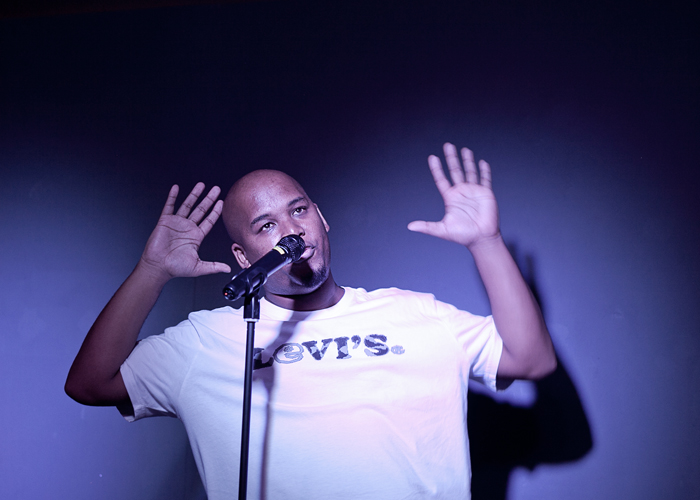
Having a bit of Adrian allowed us to prepare ourselves for the mighty Rimestein, fast becoming a SLiP regular after his stupendous performance at last year’s Slam, a main event performance immediately afterwards as well as an open mic performance recently. And so, to the stage came the man from Mitchell’s Plain. What irked me here was, after the respect given to Coco before she’d even uttered a word, the crowd at the back of the venue started getting rather noisy and the bar area became a distraction zone. There was too much talking and moving about going on, which I thought was disrespectful to Rimestein, not to mention unfair, and before he’d even gotten started, it seemed he had a few obstacles to face. He was not thrown off balance at all and opened by asking, “is almal tuis?” A nice touch: we were indeed home.
Rimestein, in addressing us, emphasised his hip-hop artistry as his mainstay, pointing to poetry as an experiment, but before he could continue being too modest about his abilities, Adrian cut him short and encouraged him to get on with it. This was a sound move because, humble man that he is, we don’t want to see a shy and retiring Rimestein. Not ever. He opened with “God se plan”, and immediately we were reminded of the flow of pure Afrikaans Rimestein has mastered. Familiar themes in his work also surfaced in this poem: there was a challenge to Christian zealots but not at all a denial of the power of the religion; there was also his lamenting those fenced in by Mitchell’s Plain, where, in his schematic, wine leads to violence.
On that last point, Rimestein is surely emerging as the sage chronicler, the poet who most sagaciously speaks of the role of wine in “misgrowth”—in Mitchell’s Plain, in the Cape, in South Africa, in the world. This has been a constant in his SliP performances and it never loses its vivacity. Also, his take on the snarling match between the secular and the divine, localised in the Plein, is becoming a trademark. The poem openly challenges religious zealots that do not follow-through on their own preaching, leaving those in categories or classes lesser than theirs to their own salvation and downright abstracting and dismissing them, which troubles the speaker because of its blatant inconsistency. The zealots are one with larger structures that leave a group of people boxed in with alcohol somewhere close by, and a fight imminent. When he touched on the rage of the “katkissant” that never did “katkiseer”, Rimestein easily conjured up visions of thousands of coloured youths attending confirmation classes in order to find membership to the church throughout the Cape Flats.
To those of us that had been there before, here it was all over again: the looking for a place of commonality and being told it was the church, where upon confirmation the communal wine acted as the seal but also the deadly harbinger, the circus tight rope the Flats teenager had to walk. Never mind that this happens the world over. To those in the know, Rimestein brought the memory of it back, taste and all. Those that preach religion need to be sure they understand it, not just conformed rather than confirmed to it. At the moment of Death, Rimestein wondered, would it be God, Allah or Jah? But then, he never did receive the answer he was looking for, instead being told he was mad and breathing the same air as the nearest open bottle of wine, the motif returning hauntingly. Ending the poem there, Rimestein reminded us that this was once his thinking, not so now. It was quite a bit to take in, no matter where you were coming from. A pity the folks at the bar were too noisy and discourteous to know that even they would’ve found their way into the poem.
The next piece was called “Niks”, with Rimestein each time raising his hand to get “Niks” from those of us that were listening to him. Here, he told us about the life of the archetypal young male from the Flats trying to find his identity in a haze of labels, each time trying to get a little bit of something but finding instead that “daai bietjie wat jy het maak siek en sat en gek, maar hou moed, want dis beter as niks” because “niks” is what he is deluded into thinking he has for every manufactured article he cannot attain. Yet again, this powerful moment, delivered in steadfast Afrikaans, was undermined by parts of the audience becoming increasingly loud and rude, not at all suiting the reason they came in the first place. I heard one or two people complain that they’d pay more attention if Rimestein performed in English, but our vibe at SLiP/InZync crosses language barriers; perhaps they didn’t know that.
At some point, after “Niks”, the noise was becoming a real problem. But then it was Rimestein’s turn to make some noise with his next piece, “Alfabet Rymklets”, offering increasingly intense wordplay, with an emphasis on binary constructions, on each letter of the alphabet up to ‘G’, his strongest letter. You could say he was being unbelievably clever with random words but that would be to undermine Rimestein’s always-hungry mind, a mind that doesn’t fail to spot connections. No, he was creating sentences, stories and statements with every letter group. In fact, observe his theatricality when he unleashes his ideas on each letter to see how often a chosen word hits close to the bone. Spewing home-grown discourses, socio-cultural stereotypes as well as uncommon associations with each letter, Rimestein proceeded to turn the joint upside down, with some people getting so into it they found themselves on the tables and even the loudmouths at the bar were jolted into the action. This was riveting stuff, simple but dynamic—something a senior colleague of mine admitted he wished he’d done first. And, yes, the Coloured people in the house were the loudest appreciators because they could almost start guessing Rimestein’s diatribes on the next letters, yet as far as I could see, everyone in the house was being gripped by this absurd alphabet.
Rimestein promised to take the piece to its ‘Z’-conclusion at some point in the future, which is a promise we’ll surely keep him to. He had won over the crowd the hard way, the old-fashioned way, but anyone could see it was nothing new to him, this poet warrior. You could actually hear some people’s heartbeats in the house and sense their feeling proud of him, the poet, reminding me of how Maya Angelou once wrote about the pride her townsfolk felt about the mighty Joe Louis whenever he fought. To paraphrase the great Maya, there was Rimestein, some Coloured mother’s son, who looked then and there like one of the strongest men in the world.
The house was quiet, finally, for his next piece, “Jou beste weereens”, and it was just as well considering the complexity of it. This one was part celebration of the indomitable spirit crossing self-limitations, part scientific fable and biological journey. Tricky stuff, because Rimestein concentrated on a life from the womb stage, to birth, to adulthood, once again questioning prevalent ideas of Creation and perceptions around it. Through unusual metaphors and antiphons, the celebratory aspect of the poem emerged strongest, finding the “miracle” in the world that is small and without light in one moment, and shared with millions the next. A humbled crowd responded warmly.
Some of Rimestein’s most scorching Afrikaans came in his last poem, “See van heiligheid”, in which he returns to observations on religion in the Cape Coloured experience, making good on themes he’d introduced earlier in his set. In this performance, religion was posited as the mind’s negotiation of a life journey, but when we hear “kry voedsel, gee voedsel”, the journey reflects Rimestein’s wordplay skill as the verbal form of who he is. The self-reflection on the part of the poet is alluded to in the form of the poem itself, as well as in its content, a sign of Rimestein’s craftsmanship. He had no reason to be bashful about this—clearly, he knows what he is doing with words. With that, he graciously thanked the crowd and left the stage, to great applause.
Adrian stepped up and politely asked the crowd for less distracting movement when people are on stage—later on, another InZync regular wouldn’t ask it quite as patiently. Faithful to a fault, Adrian then dutifully began plugging the venue’s famous chicken and chips combo before taking a few seconds to gather himself and introduce the next poet. He explained how he and Pieter had encountered Desiree Bailey at a different poetry event recently, and knew from her performance that they just had to invite her to AmaZink. We were about to find out why.
Desiree Bailey
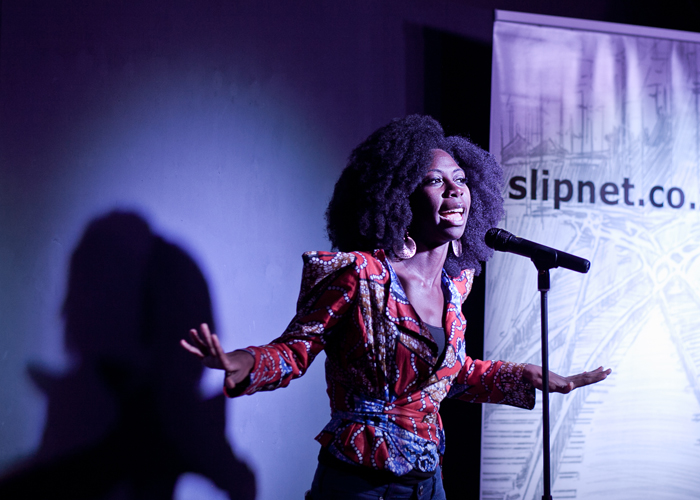
Wearing a killer jacket that looked like it was lifted off the set of Michael Jackson’s “Beat It” music video, the first things you noticed about Desiree were her style and her smile. Put quite simply, there was something quietly majestic about her, something accessible yet exotic, a beautiful woman with loads of story just in her poise. It wasn’t just that she hailed from Trinidad – no, it was more than that, although how cool is that to say you’ve hung out with a poet from the Caribbean! The crowd hushed immediately as she approached the mic. They probably knew something really, really special was about to happen.
She started with “From the Shadows of the Sun”, immediately catapulting us into beach imagery, transplanting us to the shores of her home island, but the idyllic is merely a deliberate false-start here. Trinidad’s history and its call back to Africa were projected onto the body, painting a surreal picture of how flesh takes on history that could never be printed. With otherworldly intonation, Desiree described how, through death and modernity shifting the moral shape of Trinidad, tourists still came looking for their Caribbean Queens after Carnival Mondays, when young girls knowingly or unknowingly slipped into the negating dress of history. History was shown to be a perpetuated travesty of popular fantasy, one that tried to have glamour cover exploitation and colonisation, and that forced young boys to become soldiers more at war with being soldiers than anything else—an apt metaphor for teenage boys resorting to crime. The impact of hearing the tragedies of Trinidad’s history on young people is described in this poem, and then led into more challenging perceptions of the context in which these stories are heard, a world like any other, of dance halls and sex, but wrestling with the vestiges of history. It’s hard to explain the command of layering Desiree showed in this piece alone, and how it would become the key to her work through the rest of her set.
Her next two poems were bone-chilling indictments of imbalanced relationships, taking to a peak a theme already explored by Adrian and Coco before her. In the first poem, “Rise and Fall”, Desiree uncannily, eerily mixed fearful, large-scale and complex images with a disturbing look at the personal consequences of oppression. She concentrated on a woman’s “offering” to make an oppressive force feel like a man, a “sacrifice to make her feel free”, which may allude to a kind of unthinkable barter, a hellish trade that comes to typify the relationship. It’s here where you’re supposed to use your imagination, except that your imagination does not want to go that far because it’s frozen in terror.
This immediately “bled” into her next piece, which she insisted on mentioning was not called “With This Ring” but “Through the Sickness”, as if the full corrective was actually the title. Commenting on a marriage that was from the outset as incapable as the relationship in the preceding poem (who knows, perhaps she was addressing the same couple), Desiree saw the wedding ring on the woman’s finger as the ineffectual wall between her and the male’s failed manhood that is brutally “kicked in her spine”. It was already vexing when Adrian and Coco touched on doomed relationships earlier, but with Desiree we saw that the horror lay in the fact that, for one half of the couple, it was doomed never to end. This was a slow, tortured cry against ignorant marriage, where one half of the couple is forever thinking that everything will change for the better soon. After this poem, you just had to look around to see that just about everyone had the stuffing knocked out of them, and some were gasping for air. Adrian was moved so much the last thing you heard before the sound of a crowd cracking like dry wood was the exclamation mark coming from his mouth.
Desiree was far from done yet. She continued with “Loneliness”, directed to a man still haunted by a lost lover as he allows his present relationship to slip away. The bed he and the speaker share is covered in sheets that reek of “dry tears that linger in the darkness” and that have the colour of loneliness, “drained of the blue rustling of bodies”, sheets that the speaker herself, at one point, has draped around her, as if his past were a snake on her skin. He is as broken as the bedframe, and he and the speaker are by now tired and distant even on the bed, where their spines no longer touch. The mention of “spines” no doubt had most of us remembering the marriage poem, and the image of two backs turned to each other, while not as violent, was as sad a meditation on failing relationships. Have we ever had a poet do this so quickly and effectively to us before? It was like sitting in the dentist’s chair for a filling but having your bad kidney removed in the process, possibly through your mouth. Not knowing whether you were coming or going, being emptied or being filled—this was just the beginning of how you felt.
She dipped into mythology for her next poem, aptly titled “Icarus”, an ode to being young, “three-fifths immortal”. This was remembering that “we smile like forest fires” and find moments of fleeting immortality in “shot-glasses perched between sticky fingertips” and “love songs scrawled on bathroom walls”, or have war cries of stilettos drowned out by what the bass does to those on the dance floor, their hips adorned. This is how swiftly Desiree’s images reveal the movement of youth, the I-will-reign-forever-and-fuck-you-for-not-being-me swagger that a night out induces, especially a girls’ night out. “Playing hide and seek with the sun” suggests the mornings after that seem to always side with the elusive other two-fifths of immortality that we don’t achieve while young, as we will, at some point, burn our wings like Icarus. By now, Desiree’s schemes and cadences were becoming so unbelievably potent they couldn’t have been legal, and we consumed them in the way that happens with illegal things – as if they were going out of fashion!
Of course, as we’d hoped from the start, a poet from the Caribbean had to offer us more poems explicitly about the Caribbean, and that’s where Desiree took the dummies we’d turned into with “Haemorrhaging of a native tongue”. Here was a sharp return to the dismantling of history she offered in her first poem in ways that we have never before seen at our poetry events. This was surely the stand-out poem of the evening, somehow dealing, with both aplomb and desperation, with the search for a “sacred place” in which to rest Trinidad’s language, the language of ancestors whose tongues haemorrhaged in the face of Imperialism, in the shackles of slave ships. The “real” English has remnants of “Imperialistic invasions / the pillaging of minds and bodies”, and this English fights “the pollution of white diction” and sings its rebellion. To a modern “Trini”, as Desiree has it, the uncomfortable answer to the question of “What language do you speak?” is English, yet it is not the English of Buckingham Palace, but instead a form that actually contains a different language, one of “machete syllables” and the “dead arms of Africa”, in which ordinary pronouns become objective and the body aborts the language of the Queen.
Desiree sang “Some people say that the Trinis sound British / But if this is true I refuse to hear it” to underscore the life-giving link between this “real” language of the Trinis and music. And the bodies have located themselves in music; in fact, in a maze of music that the outside world only identifies as calypso but that is far more layered and breathes the resistant method of the Trinis. Where the British may dance when they hear music, the Trinis, to the pounding of a drum, “wind and grind to the beat”; they sweat the music, engaging sensually with their island while defying its colonial history through dancing and sweating out “every ounce of Europe that lingers beneath our skin”.
Desiree drives the point home that even after her residence in New York, the real accent of Trinidad never leaves—“peel back my words”, she asks, and find the “stench of rebellion”. Unlike her great, great-grandfather, “branded with the name Joko”, Desiree’s accent is “free”, yet haunted by the spirit of its past, and still in search of its original dialect. This was by far one of the greatest, most important performances of a poem I have ever experienced, a topic so large no larger-than-life book or film could do it justice. David Attwell, Gabeba Baderoon and Meg Samuelson, to name an immediate few, write about similar topics and I imagine if any of them saw this performance they’d each write a new book on it. This is, again, that ever-so difficult merging of the epic with intimate, and Desiree approached it as a god in human form, in a killer jacket. What an extraordinary poet!
Desiree followed this with a shorter poem, a simple observation of a man “with nothing but the wind between his teeth”, the love of the speaker encouraging him to strengthen his bond with her, to let her fall into him, her back “arched like a bow” – the final description of the human back is finally a positive, promising one in Desiree’s set. It was almost frightening how easily Desiree could move between immense resistances in her poetry to subtle, affectionate sharing. The lovers, “warriors” and “survivors of oil and auction” in proclamations of endurance, “dare to be beautiful”. Wonderfully crisp and affirmative, here we found the speaker being both tender and tough, pouring life and love into the body of another and fusing their souls against struggle, the kind of “we shall overcome” cry we South Africans remember only so well.
In her last poem, which Desiree said was untitled and lighter than her previous ones, was inspired after she attended a Mos Def concert in New York. The speaker in the poem observes her partner’s almost sensual interaction with every word coming from Mos Def and wishes: “hold me like your favourite rap song”. From there she continued with mischievous but wholly poignant metaphors of the concert experience with her lover, a playful ménage-a-trois of sorts in which her desires for the fullness of his embrace accompanies the total state of exhilaration they are already in. “Your sweat was Holy Water, holding me down”, she remembers, only seconds after wondering if perhaps Mos Def was a Voodoo Priest, such was their gyrating.
The speaker wonders whether her partner will catch her if she should climb the peak of the ecstasy the concert brings and stage-dive. After her partner replies, “I got you, I’ll never let you fall”, the concert ended. The crowd obviously thought that that was the short-snub ending to the poem, but it was only to the concert in the poem – you could see Desiree setting us up and enjoying every second of it. What followed was her tantalising recollection of the aftermath of the concert. The couple returned home after the concert, watching “city stars that were once coins we threw into the wishing well of the night” – Desiree’s only moment of pure corniness in her whole set came at the right time, as ultimately the love dies like “autumn leaves on the pavement”, but it does well to call the final memory. The music is the mutual remembrance the couple share as they come together and briefly recapture the glow of what they felt at the concert, their intensity taking them through the night to the next morning, creating the “mix tape we will cradle in our graves”. It’s bittersweet and perhaps Desiree’s delivery was a bit much, but whichever way this carnal poem hits you, chances are you know exactly what she describes and what it feels like.
With that ended what I am convinced is the strongest, most resounding set any poet has yet performed at SliP/InZync. Jitsvinger may well be the best performer we’ve hosted, but let me claim in no uncertain terms that I think Desiree Bailey is the most profound poet to have graced us with her presence. In a single poem she does more than a collection of books dedicated to one subject. Her complex layering and her ability to be nuanced, loud and decorous sometimes in the same line is not something we’ve seen much of at our Slip sessions, and I remind you that we’ve not been short of exceptional poets. Grace and empathy pervade Desiree’s work and there is astonishing maturity there even as she delights in the exuberance of youthful lyrics. Her resistance poetry is emotive without being intransigent and her meditations on love are part youthful bliss, part sad but astute reflections and plenty tantalising for both the good and the bad. Her set was long but always powerful, with the minor exception of the slightly mis-stepping final poem, nevertheless a poem that was still in key with the others she’d performed. It helps that there was something of a minor hiccup with that last one, because it added an innocent charm and finally stopped me from thinking that Desiree flew in from another planet where they make super beings like her to come and save us from the i-Pad, reality television and Steve Hofmeyr. We are very grateful.
This main event, with these three stellar performers, is going to be hard to top.
Open Mic
Business got underway quickly with the open mic, after Adrian performed an impromptu freestyle to urge people to their seats. Then, something very magical happened. You remember I called this SliP event a homecoming. Well, here’s a big reason why: to the stage came our resident poetry Queen Khanyisile Mbongwa and next to her was Tebogo Louw. Let’s first put it simply: the Queen and King of AmaZink were back! This was the first time in 2012 we’ve seen Khanyi and Tebo on stage together, and it was long overdue. We know what verbal dynamite Khanyi is capable of and we know the splendour of Tebo’s honey-toned voice and immaculate guitar skill. Immediately, you knew they were in the house: Khanyi sharply reprimanded the noise-makers at the back,

reminding them that she was a poet and she needed their silence in order to perform. The Queen had spoken, and everyone shut the fuck up. I didn’t even want to think too loudly. Tebo started tuning up and chopped out a few jazz chords in the playing style we’ve come to expect from him. We had been deprived of the sight of our young Queen and young King together on a stage ever since October 2011. Both had solo performances lined up the following week—Khanyi was to appear at the English Department of Stellenbosch University and Tebo was due back at AmaZink the following Friday to do a solo set. The fact that they were establishing themselves as solo artists added to the excitement of seeing them as a duo. When you have such a combination on a stage, you need to be ready for fireworks.
As it was, the fireworks were called off in favour of waterworks, as by the time they finished, the Queen and King had just about half the audience in tears of elation. You see, they decided to put together a variation of arguably the greatest “folk” song ever written, Bob Marley’s “Redemption Song”. While Khanyi spoke and Tebo sang all the necessary refrains of this masterpiece, Khanyi used it as a springboard for her own ruminations on the theme of mental and spiritual redemption and Tebo took daring but also wonderfully understated jazzy breaks on the guitar. Khanyi’s poem travelled rousingly, portentously delivering the message of hope and harmony (both on the inside as well as the outside) and eventually it became a full-on jam that involved just about everyone in the venue. Tebo’s singing improvisations went postal and required their own area code, and anyone who wasn’t dancing or singing along was sitting and crying softly, such was the reunion of the Queen and the King.
A woman king, preferring not iron but wine and named Gina King was next, reading a poem titled “Whiskey”, dedicated to SLiP stalwart and poet extraordinaire Pieter Odendaal. She showcased incredibly mischievous ideas around a theme in which post-coital metaphor seemed applied to the act of writing. Or so it seemed – who the hell knows, as it was all quite tongue-in-check and Pieter enjoyed the in-jokes. If I remember correctly,

Gina was actually drinking a glass of whiskey as she read the poem, which obviously added a nice touch, as only Pieter would ultimately “get” what the poem was about.
The classy Alison appeared next, performing “To Be Black”, but the quality of the sound control was not good, meaning that she had to endure an awkward wait for her backtrack to be cued that ultimately never came. Faulty mics and backtracks not playing marred the February and March SliP events as well, and this needs to be looked into. Alison gamely proceeded without her backtrack, which is unacceptable. Nevertheless, Alison did well. Even though the poem offered a rather routine and overly-familiar message, the affirmations in it were soothing and carried the lines forward, especially in Alison’s assured delivery. The inclusion of a Steve Biko quote of blackness being “not a matter of pigmentation,
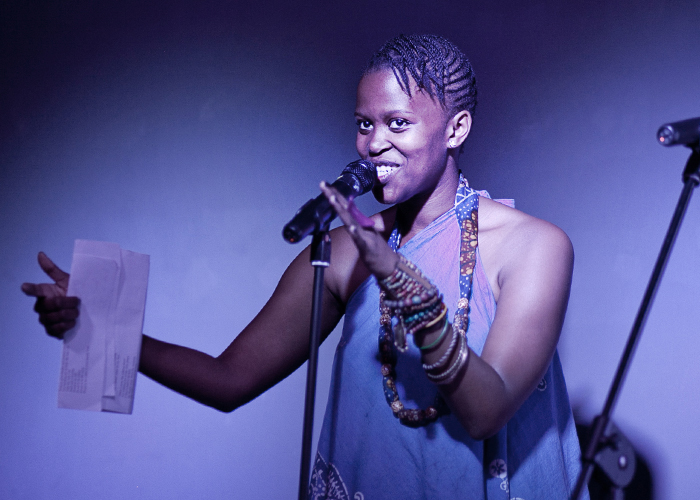
but mental attitude” indicates Alison’s concern with mental attitudes forgetting the wisdom of the late, great BCM leader.
Lwandile, an old favourite and open mic regular in 2011, returned to the SLiP/Amazink stages, punctuating the “homecoming” feel of the event. He was the first poet to perform in Xhosa on this night. Wily fox that he is, he led the crowd in a chant and was slinking on and around the stage, reminding us of his showmanship. This introduction alone went over the three-minute limit, but when everyone in the joint grooves along with Lwandile,
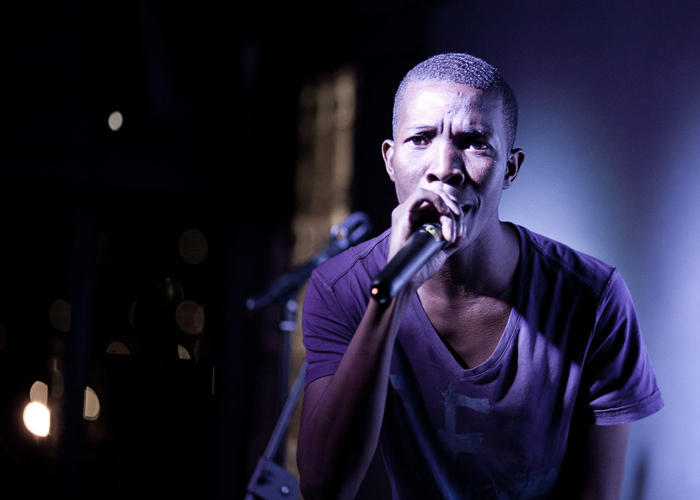
you wouldn’t want to be the one to blow the whistle on it. The stage lighting changed for him as he started performing his first poem, after which Adrian had to pull the plug on him. No matter, though—it was clear to us all that Lwandile was back.
Another crowd favourite, Mr T, then took the stage, and it was interesting to see how he would perform, as at the previous SLiP open mic he revealed deft rhyming skill and an ability to twist his words into the heart of a social reality,
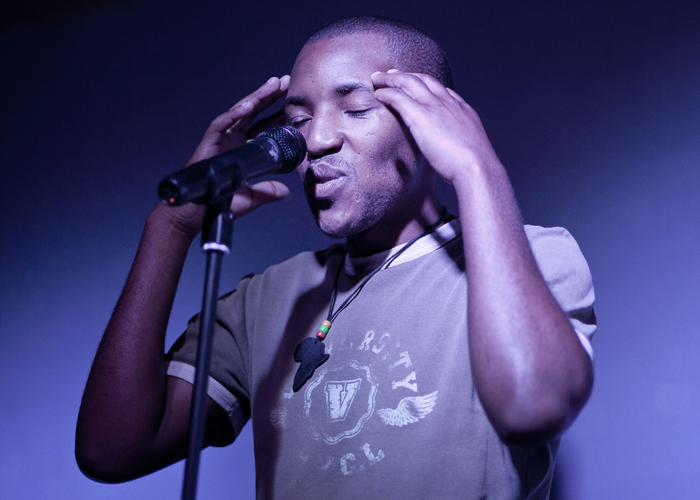
yet never seemed too confident on the stage. Cleverly, he started off by riffing on Lwandile’s chant and getting the crowd suitably warmed up and laughing. He then told us that his first poem was written for his “lady”. While there was an odd balance between rather conventional expressions of love and some outright dodgy bits, the poem held together well and revealed itself as being, basically, a marriage proposal. He followed that up with “The Book of Why’s”, preluding it by saying that it was not meant to offend. It wasn’t a particularly striking critique of white-owned business power in the country but a very provocative one, and Mr T threw a twist in with the last “why” being, “Why Zuma for president?”
Yet another regular, Pume, was next, and hilariously, he also copied Lwandile’s chant before asking the crowd if they wanted something “intense” or “relaxed”. Joined onstage by a friend thwacking a djembe at the right moments, Pume offered a sound piece on patriotic priority, with the crowd immediately on his wavelength. It may have been a bit preachy, but it was definitely a good fulfilment of the “intensity” the crowd had asked for. Also running over the time limit, Pume was allowed to do a second poem, a light-hearted ode to Africa and his “African Queen”,
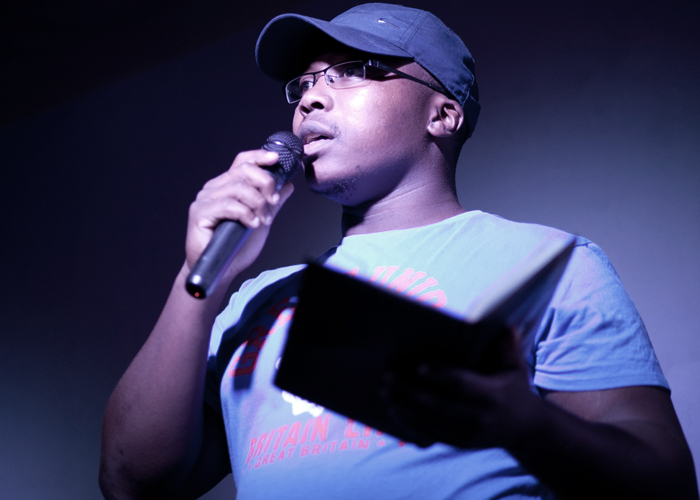
who is “African Size” and who embodies some of the best traits of Africa herself. Relationships clearly came to the fore in most of the poems at this event and it was fun to pick up on. Make no mistake, Pume is a serious poet, and this was an improvement on his performance at the March Open Mic.
Tarren, a first-timer and newcomer to Slip/InZync, amazingly also played into another relevant theme to the main event poems: that of abuse in a relationship. Reading her very short poem off her phone,
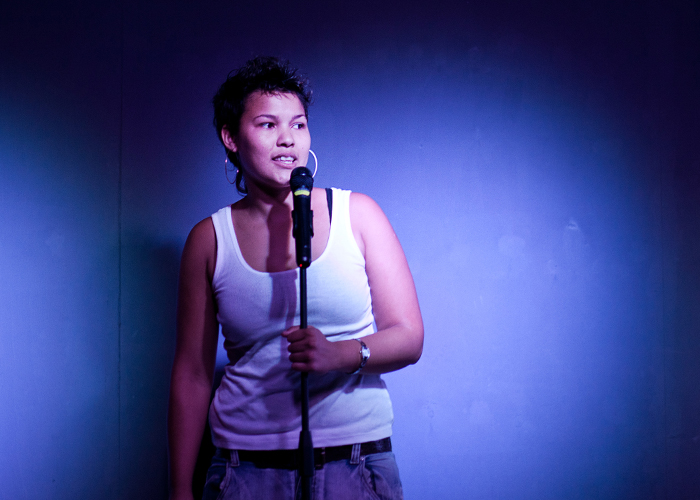
Tarren stammered but did well, and was the only poet after Gina to stay within the three minute limit.
Claude wrapped up the longest poetry evening we’ve yet experienced at SliP/InZync with a poem titled “Closet MC”,
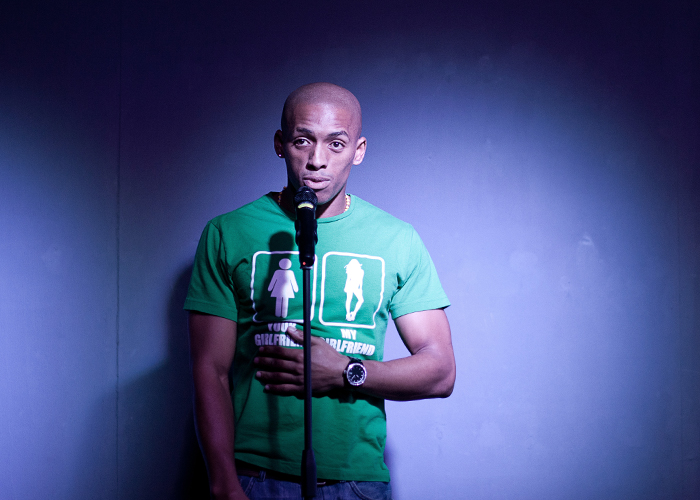
focusing on the hip hop MC as both messenger and civilian. His slow, steady delivery underlined the poignancy of his lyrics and very skilled manipulation of lyrical schemes, and we hope to see more of him in the future. It was a great way to end a marathon evening, just before the weather finally broke, too, and the rain cooled us off.
 SLiPStellenbosch Literary Project
SLiPStellenbosch Literary Project